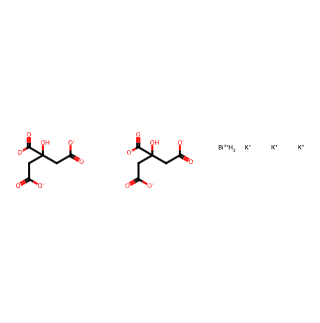- Synthetic anti-infective drugs
- Medications for the digestive system
- Antipyretic and analgesic drugs
- Medications for the blood system
- Medications for the respiratory system
- Anti-allergic drugs
- Medications for the urinary system
- Diagnostic medications
- Immunosuppressive and immunomodulatory drugs
- Vitamins and mineral supplements
- Antioxidants and medications for osteoporosis
- Antiparasitic drugs
- Ophthalmic medications
- Amino acids and their derivatives
- Dermatological medications
- Medications for the circulatory system
- Antitumor drugs
- Medications for the nervous system
- Hormonal and endocrine function-regulating drugs
- Antibiotics
- Others
CAS NO.: 57644-54-9




Bismuth Potassium Citrate
Bismuth Potassium Citrate, also known as Potassium Bismuth Citrate Trihydrate or Colloidal Bismuth Subcitrate, is a commonly used medication for protecting the gastric mucosa.
Basic Information
English Name: Bismuth Potassium Citrate
Alternative Names: Potassium Bismuth Citrate, Colloidal Bismuth Subcitrate, De-Nol, Tripotassium Dicitrato-Bismuthate, etc.
CAS Number: 57644-54-9
EINECS Number: 260-872-5
Molecular Formula: C12H10BiK3O14
Molecular Weight: 704.47
Physical Properties
Appearance: White powder, salty taste, hygroscopic
Solubility: Highly soluble in water, very slightly soluble in ethanol
Nature: Its aqueous solution forms a colloidal solution with a slightly alkaline pH
Pharmacological Actions
Gastric Mucosa Protection: Under the pH conditions of gastric juice, it forms a solid bismuth oxide colloid precipitate on the ulcer surface or at the base of the ulcer granulation tissue, serving as a protective film that isolates the ulcer mucosa from the erosive effects of gastric acid, enzymes, and food. This promotes the repair and healing of ulcer tissue.
Anti-Pepsin Activity: It can complex with pepsin, rendering it inactive.
Modification of Gastric Mucus Composition: It promotes the secretion of bicarbonate and mucus, prevents the degradation of mucus glycoproteins, and enhances the gastric mucosal barrier.
Prevention of Hydrogen Ion Back Diffusion: Enhances the defensive capabilities of the gastric mucosa.
Promotion of Prostaglandin Release: Stimulates the release of endogenous prostaglandins, increasing the concentration of prostaglandin E2 in the stomach and duodenal mucosa, thereby protecting the gastric mucosa.
Eradication of Helicobacter Pylori (HP): Improves gastric mucosal blood flow, eradicates HP, and delays the development of HP resistance to antibiotics.

Tai Yau Street, San Po Kong, Kowloon, Hong Kong, China.



